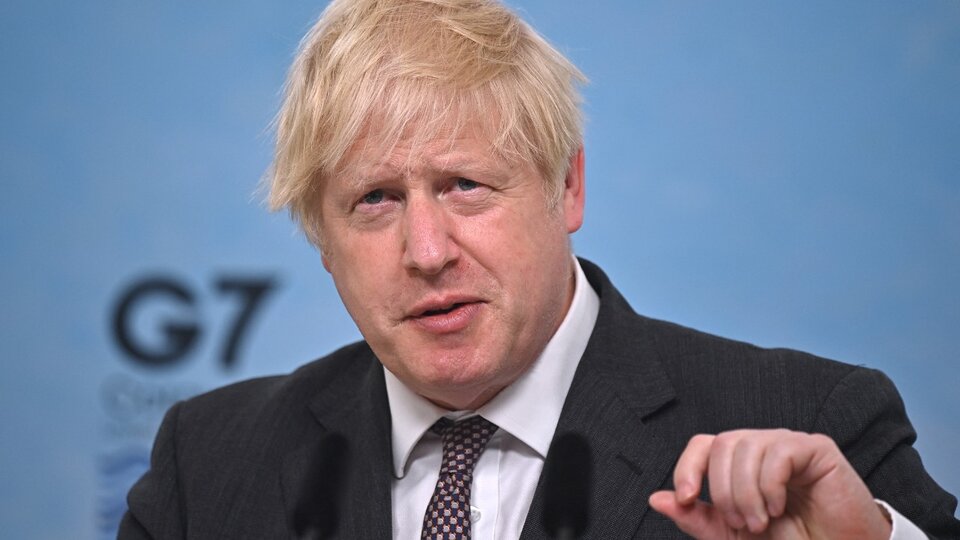From London
This Monday Boris Johnson Will Give An Announcement That May Define Your Future politics and the health horizon of the United Kingdom in the face of the coronavirus. Thanks to the successful vaccination program, the British have forgotten their disastrous handling of the pandemic last year, but a new miscalculation about the exit from the current confinement and it will be almost impossible to erase the criticism for the more than 127 thousand deaths that have occurred since March of last year.
In weekend meetings with key members of your cabinet (Finance, Health, and the chief of staff) Johnson has been debating the dilemma posed for his government by the growth of cases of the new dominant strain, India. Extending the last stage of release from confinement up to four more weeks would allow time to advance with the vaccination program and analyze the impact of this Delta variant on the number of hospitalizations, infections and deaths, but it would also frustrate a sector of society, of the Conservative Party and economic groups that have called June 21, “freedom day.” On the other hand sContinuing with this date leaves the government exposed to the apparently exponential growth of the Delta strain ending in a new wave of coronavirus with a high health and political cost.
In the framework of the G7 summit, the prime minister gave a first signal that, contrary to the superficial optimism with which he usually announces his decisions, this time he will be cautious. “If you want to have a roadmap out of confinement that is irreversible, you have to act with caution,” he told the ITV television network.
In theory Johnson doesn’t want to take one step forward and two steps back.
The output phases
June 21 is the last phase of the four that the government announced in February to get out of the third national lockdown that began at the beginning of the year. The government promised that the passage from one phase to the next – with the corresponding liberalization of economic and social activity – would be guided by “data no dates”, a play on English words, to indicate that dates (dates) they had to be subordinated to the data of the pandemic (data). This data has two pillars: the vaccination program and the appearance of new strains.
Today, this is what the data says:
* infections are growing at their highest intensity since the third wave that was experienced this winter
* the number of daily infections increased between 3% and 6% on average. In some areas of the North West of England it climbs to 8%.
* 8,125 new cases were registered on Friday, an increase in infections that had not been seen since the end of February.
The alarm signals are turned on when these data are crossed with those of the new strain and the vaccination levels. The Delta variant, which today constitutes 96% of new cases, is 60% more contagious than the Alpha, better known globally as the British strain, dominant during the third wave this winter. But also the evaluation made by scientists is that the protection offered by the vaccine against Delta is less than with Alpha: 33% with a single dose and around 80% with the second.
At this time, more than 41 million out of a total population of almost 67 million have received the first dose, approximately 62% of the population: of this percentage, more than 44% had both inoculations. In other words, there are around 18 million who have to complete their inoculation process, to which are added about 10 million more, from the 40 to 20-year-old group, who have not been vaccinated.
To this complex mathematics (degree of exposure of those who have a single dose and those who have none) must be added a worrying fact. According to the latest information from Public Health England, Of the 42 deaths recorded in the past 28 days with a positive swab, 23 had not received the vaccine, seven had received one dose and 12 had both doses.
It is true that this last information is not disaggregated to cross it with the degree of vulnerability of the deceased, but it makes it clear that no one is 100% covered by vaccination, something that is not incorporated into the behavior patterns of the population as a whole . The British Medical Association (BMA) recommended postponing the “freedom day”. “The maximum protection of the vaccines is reached two weeks after the first dose. It is clear that we are not going to have a sufficient percentage of vaccinated to be better protected, ”says the director of the BMA council, Chaand Nagpaul.
Boris choice
The decision is political. The cost as well. There is the dilemma for Boris Johnson who has the tendency to say what the other wants to hear, a matter of adding a smile, putting faith in it and everything will be fine.
This time it will not be so easy. If you postpone June 21, you will disappoint the hard wing of your party, the entertainment, hospitality and gastronomy industries., and the social sectors that want to regain normalcy, including those who want to organize their vacations and some 50,000 couples who are waiting for the decision to get married and have the party they have dreamed of for so long.
If you do not postpone it and a third wave occurs, you will not be able to plead ignorance about a new phenomenon. The suffering of the last 15 months, relegated to the background by the relief that vaccination brought, will reappear with unappealable questions of negligence. The public investigation of what happened, which despite the protests of the relatives of the deceased, will take place only at the beginning of next year, will probably be advanced. Everyone knows that openness brings a higher level of contagion: the question is whether the country is in a position to absorb the impact.
– .


